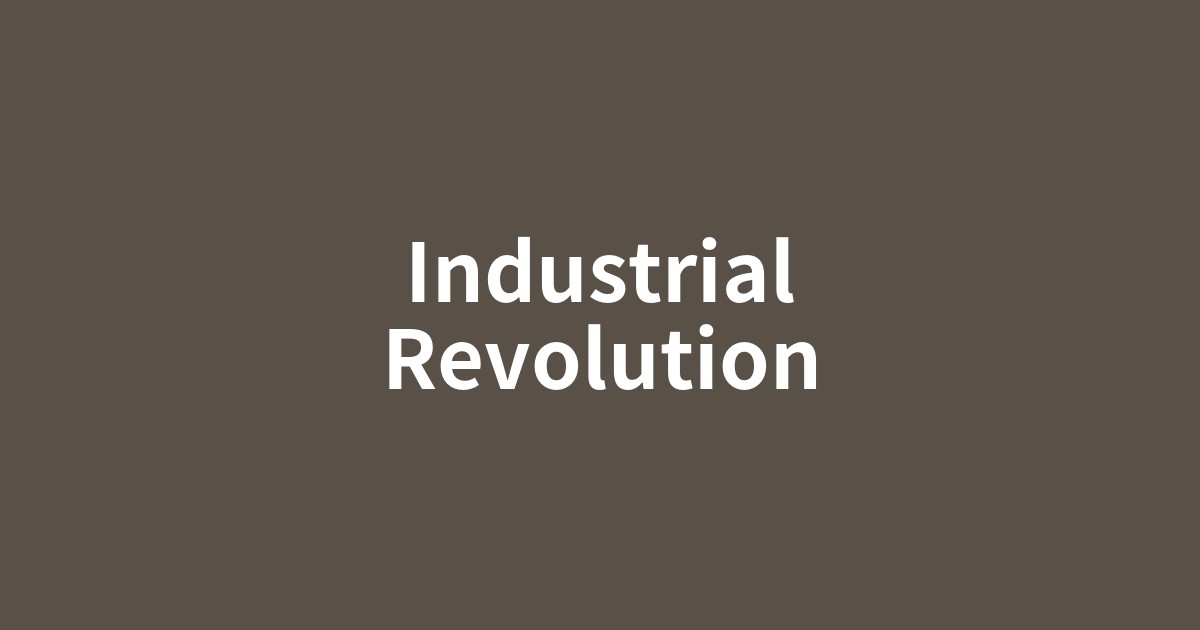このページは、歴史や文化の物語を楽しみながら、その文脈の中で重要な英単語を自然に学ぶための学習コンテンツです。各セクションの下にあるボタンで、いつでも日本語と英語を切り替えることができます。背景知識を日本語で学んだ後、英語の本文を読むことで、より深い理解と語彙力の向上を目指します。

蒸気機関の発明が、人々の暮らしを根底から変えた。工場、都市化、そして新たな階級の誕生。近代社会の原点を探ります。factory urbanizationを学びます。
この記事で抑えるべきポイント
- ✓産業革命は単なる技術革新に留まらず、社会構造や人々の生活様式を根底から変えた歴史的な転換点であったとされています。
- ✓蒸気機関などの発明が、従来の家内制手工業から工場制機械工業への移行を促し、大量生産の時代が始まったと考えられています。
- ✓工場の周辺に労働者が集まることで都市化(urbanization)が急速に進展し、衛生問題や住宅不足といった新たな社会問題が発生する一因となりました。
- ✓生産手段を持つ資本家と自らの労働力を提供する労働者という新たな階級が生まれ、これが後の社会運動や思想に大きな影響を与えたという見方があります。
産業革命と社会の激変
もし、ある日突然、私たちの働き方や暮らし方が全く別のものになるとしたら、どう感じるでしょうか。18世紀後半のイギリスで始まった産業革命は、まさにそのような劇的な変化でした。蒸気機関の煙が空を覆い、機械の音が鳴り響く。それは、現代社会のあらゆる側面の原点を探る旅の始まりでした。この変化は、単なる技術の進歩ではなく、社会の仕組みそのものを根底から覆す、まさに「革命(revolution)」と呼ぶにふさわしい出来事だったのです。
The Industrial Revolution and Societal Upheaval
What if, one day, the way we work and live were to suddenly become completely different? The Industrial Revolution, which began in Great Britain in the late 18th century, was precisely such a dramatic change. The smoke from steam engines filled the sky, and the sound of machinery echoed. It was the beginning of a journey to explore the origins of every aspect of modern society. This change was not merely technological progress, but a true "revolution" that fundamentally overturned the very structure of society.
革命の火種:なぜイギリスで始まったのか?
産業革命以前、世界の多くの地域と同じく、イギリスもまた農業が中心の社会でした。しかし、この国には、歴史の歯車を大きく動かすための条件が揃っていました。広大な植民地との貿易は莫大な富と資本をもたらし、国内には石炭や鉄鉱石といった天然資源が豊富に存在しました。さらに、科学的な探究心や新しい技術への関心が高まっていたことも、数々の画期的な「発明(invention)」が生まれる土壌となったのです。これらの要因が複雑に絡み合い、イギリスは世界に先駆けて産業化への道を歩み始めました。
The Spark of Revolution: Why Did It Begin in Britain?
Before the Industrial Revolution, Britain, like many parts of the world, was a society centered on agriculture. However, this nation had the right conditions to turn the gears of history. Trade with its vast colonies brought enormous wealth and capital, and the country was rich in natural resources like coal and iron ore. Furthermore, a growing interest in scientific inquiry and new technologies created a fertile ground for numerous groundbreaking "inventions". These factors intertwined, allowing Britain to pioneer the path to industrialization ahead of the rest of the world.
蒸気と鉄が世界を変える:工場(factory)の誕生
産業革命の象徴ともいえるのが、ジェームズ・ワットによって改良された蒸気機関です。この力強い動力源は、それまで人力や水力に頼っていた生産プロセスを一変させました。特に織物産業では、蒸気機関が紡績機や織機を動かし、生産性は飛躍的に向上。人々は家内制手工業から、機械が設置された「工場(factory)」で働くようになり、ここに「大量生産(mass production)」の時代が幕を開けたのです。製品は安価になり、人々の生活に浸透していきましたが、同時に、働き方の概念も大きく変わっていきました。
Steam and Iron Change the World: The Birth of the Factory
The steam engine, improved by James Watt, is a symbol of the Industrial Revolution. This powerful source of energy transformed production processes that had previously relied on human or water power. In the textile industry, in particular, steam engines powered spinning and weaving machines, dramatically increasing productivity. People shifted from cottage industries to working in a "factory" where machines were installed, heralding the dawn of the age of "mass production". Products became cheaper and permeated people's lives, but at the same time, the concept of work itself changed significantly.
都市の光と影:都市化(urbanization)の現実
工場での仕事を求め、多くの人々が農村から都市へと流れ込みました。この結果、マンチェスターやリヴァプールといった工業都市が急速に発展し、前例のない規模での「都市化(urbanization)」が進展します。都市は活気と機会に満ちた「光」の側面を持つ一方で、深刻な「影」も落としました。急激な人口増加にインフラ整備が追いつかず、住宅は不足し、衛生環境は劣悪でした。多くの人々が狭い空間に密集して暮らし、伝染病が蔓延することも少なくなかったのです。これは、現代にも通じる都市問題の原点といえるでしょう。
The Light and Shadow of Cities: The Reality of Urbanization
Seeking work in factories, many people flocked from rural areas to cities. As a result, industrial cities like Manchester and Liverpool grew rapidly, and "urbanization" on an unprecedented scale progressed. While cities had a "light" side, full of vitality and opportunity, they also cast a deep "shadow". Infrastructure development could not keep up with the rapid population growth, leading to housing shortages and poor sanitation. Many people lived crammed into small spaces, and infectious diseases were rampant. This can be seen as the origin of urban problems that continue to this day.
新たな社会の階層:資本家と労働者の出現
この大変革は、社会の構造にも大きな変化をもたらしました。工場や機械といった生産手段を所有し、事業を拡大していく「資本家(capitalist)」と、自らの労働力を提供して賃金を得る「労働者(laborer)」という、新しい社会「階級(class)」が明確に分かれていったのです。富を蓄積する資本家と、日々の生活のために働き続ける労働者の間には、次第に大きな経済的格差が生まれました。この対立構造は、後の労働運動の激化や、社会主義といった新しい思想の誕生に大きな影響を与えていくことになります。
A New Social Hierarchy: The Emergence of Capitalists and Laborers
This great transformation also brought significant changes to the social structure. A new social "class" system clearly emerged, divided between the "capitalist", who owned the means of production such as factories and machinery and expanded their businesses, and the "laborer", who provided their own labor to earn wages. A large economic gap gradually formed between the capitalists who accumulated wealth and the laborers who worked continuously for their daily living. This confrontational structure would later have a major impact on the intensification of labor movements and the birth of new ideologies such as socialism.
おわりに
産業革命は、技術革新が社会のあり方、人々の価値観、そして世界の勢力図までをも塗り替えた、巨大なうねりでした。私たちが今日享受している物質的な豊かさや便利な生活は、間違いなくこの時代の恩恵の上に成り立っています。しかし同時に、現代社会が抱える格差の問題や環境問題といった課題もまた、この時代にその根を持つものが少なくありません。歴史を学ぶことは、単に過去を知ることではなく、現在を深く理解し、未来を考えるための羅針盤を手に入れることなのです。
Conclusion
The Industrial Revolution was a massive wave of change where technological innovation reshaped society, people's values, and even the global balance of power. The material wealth and convenient life we enjoy today are undoubtedly built upon the benefits of this era. However, at the same time, many of the challenges modern society faces, such as inequality and environmental issues, also have their roots in this period. Studying history is not just about knowing the past; it is about gaining a compass to deeply understand the present and contemplate the future.